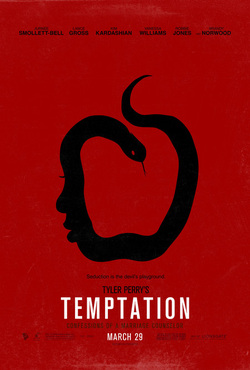
After watching Tyler Perry’s very underwhelming “Temptation” film, I was not only reminded as to why I don’t support him financially anymore, but was also disgruntled by the fact that I wasted my time to watch this sad attempt at a movie. The following is a mix between a movie review and a Tyler Perry critique/letter, so in case you’re wondering, I give the movie a D-. *Warning: This review contains spoilers*
Tyler Perry, I’m very confused about your lack of creativity and the mixed messages you are portraying to the black community in the disguise of a “moral message” and it’s getting annoying. It feels as if you think your audience is too dim to understand something deeper than a bible scripture and I honestly don’t understand why you won’t take a risk to make an exceptional movie. “Temptation,” for example, had me intrigued for the first hour because it could have gone several ways: The infidelity-embroiled main character, Judith (portrayed by Jurnee Smollett), could’ve remained happily in a secret affair, divorced her husband (Lance Gross) and married the new guy (because that does happen in the real world) or taught her husband the very qualities she wanted see and have a thriving marriage (because that happens in the real world also). Hell, she could’ve felt guilty and committed suicide after keeping the affair a secret for a few years and had a child, not knowing who the baby’s biological father was. But no…let’s just make the guy she cheats with a wicked villain, like you do in every movie about relationships. I’m SICK of the Tyler Perry formula.
Why is it that every guy a woman falls for in a Tyler Perry film has to be more than just an incompatible match? Why does he have to be a greedy, abusive, drug dealing, HIV positive, illegal gun selling, puppy killing, crack-head? No man is that horrible and for the rare ones who are, I don’t think they’re ever nearly as wealthy or handsome as the characters in these films. Some of you may say “Okay, whatever, it’s just a movie,” but to that I say most of his movies (and movies in general) are based in some reality or want to affect the way you perceive your reality. I’m over this part of the formula because it purposes there are only two types of guys out there. Also, it makes me feel like Perry is low key trying to convince us to stay comfortable, especially in this movie: “Yeah, these people are rich, but they are evil, so be happy you’re unemployed and living below the poverty line; at least you’re sanctified and will get into heaven after you die.” Yes, this was one of the major themes of the film and the “rich men can’t get into heaven” line was used by the archetypal overbearing Christian mother character (Ella Joyce), because yeah, it’s a Tyler Perry movie (then you realize that Perry is one of those “rich men,” but we won’t question that shade).
Additionally, ironically for the first time, Perry doesn’t make Judith a “victim;” she ends up demolishing her own life. I hated that the most, because I was actually rooting for her in this adulterous relationship. I don’t condone cheating in the least, but her character was one that was raised by a domineering, conservative mother who had her in church 7 times a week, only knew one boy/man her entire life and never fully experienced the world outside the confines of her religion and husband. So yes, her finding a guy (Robbie Jones) who was everything she had never seen before was enthralling, and I wanted him to be a ‘good guy,’ so we could see if she wanted to risk losing what she already had for something better or just settling like she’s always been taught to do. The saying that the ‘grass isn’t always greener on the other side’ does ring true in all facets, but I’ve never heard of someone seeing dirt and dead leaves and mistaking it for green(er) grass.
The best part of the film was the progression of the main character, up until Tyler decided to turn Smollett into Satan’s little helper—I was waiting for a scene where she and Jones became devil-worshippers, because it was literally that overdramatic. However before then, she became more outspoken, more honest about her feelings (at least to herself) and willing to change her outward appearance to boost her self-esteem. Although, you know that goes against Christian values in regards to women, so she deserved what she got in return (at least that’s the message I received). The script was very flawed, unrealistic and had holes. The parts that seemed more plausible were delivered by the actors/actresses who couldn’t portray them well. Brandy could’ve been left out because her character was only there to withhold the most expected “plot twist” in movie history.
Back to Tyler before I wrap this up: Sir, I feel as though you either don’t take yourself as an artist/screenwriter seriously, or you’re spending too much time trying to appease church folks. There has to come a time where you realize you’re not growing at all as a writer and the movies you’re creating are utter foolishness and misleading. When it’s revealed that one of the characters has HIV, some audience members laughed. Yes, it was humorous to them and I don’t know if it was because of how random it was, the actor who said it or it was really quite expected, but either way, it was taken as humor to some of your fan-base. To me, a lot of the religious moments were extremely comedic in nature because of how over-the-top they were. If you were a new writer, I’d probably give you some slack, but as long as you’ve been writing, there is no excuse. Things like religion and HIV shouldn’t be (unintentionally) taken as comedy by your audience. Also, your movies shouldn’t drag on for an hour and then in the last 10 minutes speed through time faster than “Back to the Future (with flashbacks and storytelling sequences, the last 30 minutes literally spanned through about 30-40 years).” There must be a balance, so on all levels, Tyler Perry, I give you 2 thumbs down-both for this movie and your recycled ideas. It’s clear you think people shouldn’t progress and move forward, because looking at Judith in “Temptation,” it’s too big of a risk to you and that explains why you, yourself, haven’t progressed as a writer.


 RSS Feed
RSS Feed